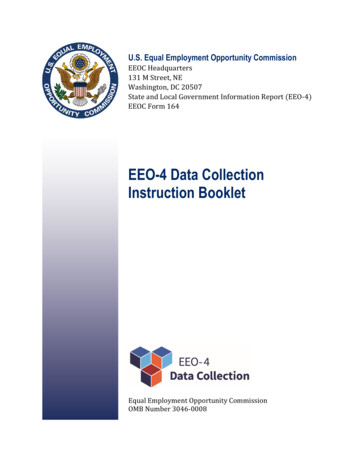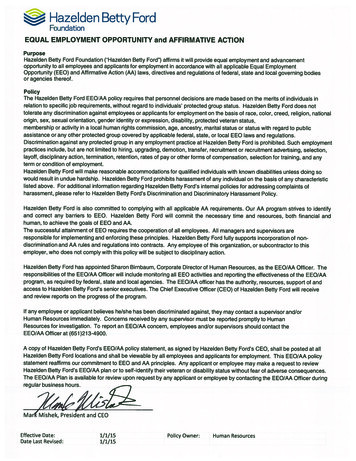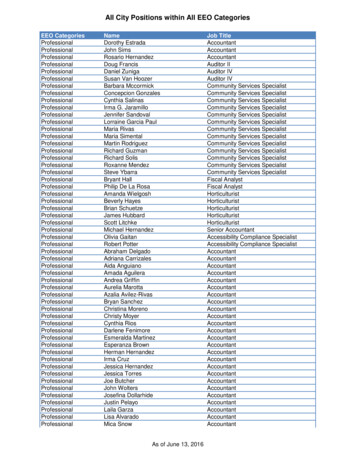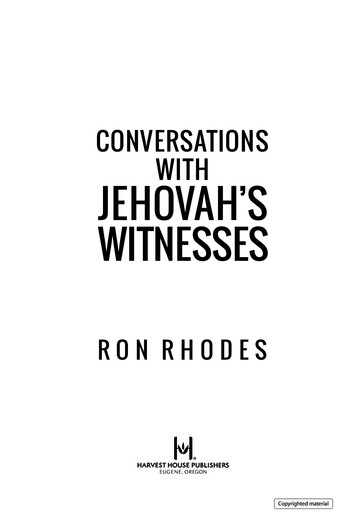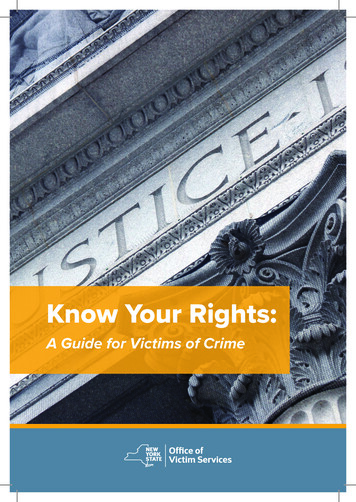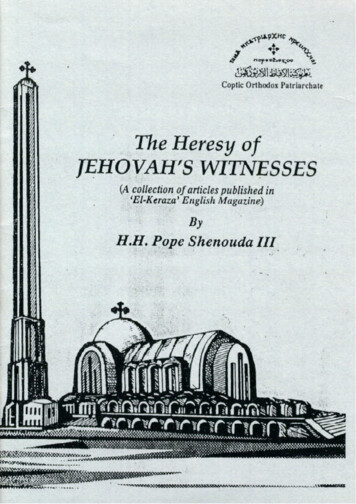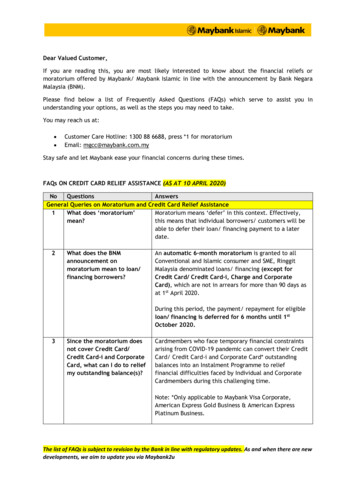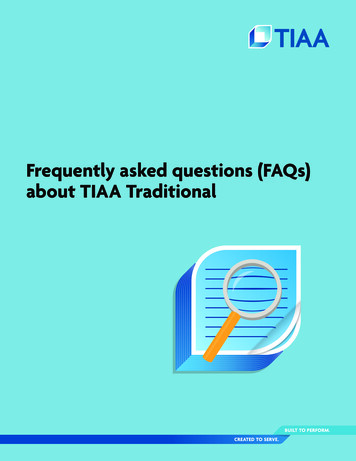
Transcription
EEOFREQUENTLY ASKED QUESTIONS (FAQs)BY WITNESSES IN THE FORMALEEO COMPLAINT PROCESS
FREQUENTLY ASKED QUESTIONS (FAQs) BY WITNESSESIN THE FORMAL EEO COMPLAINT PROCESSThese FAQs provide general information to personswho are contacted regarding an equal employmentopportunity (EEO) complaint. This information isintended solely to inform witnesses, management orother agency officials, and/or union representativesabout the EEO process in general. It is not intended aslegal advice. For further questions, contact your bureauEEO Officer or the Department of Treasury’s Office ofCivil Rights and Diversity (OCRD).1 Who makes the determination as to whetherto accept a Complainant’s formal complaint?All formal complaints of discrimination are filed with theDepartment of the Treasury. An EEO Specialist withthe OCRD reviews the complaint and the Report ofCounseling to identify the claims, issues, and bases ofdiscrimination raised in the complaint. The Specialistthen recommends whether the Director of the OCRDshould accept the claims in the complaint or shoulddismiss part or all of the complaint for proceduralreasons. Acceptance of a complaint is not based onan assessment of the merits of the claims.A ccepted claims are assigned thereafter to anEEO Investigator for the purpose of conducting anappropriate investigation.
2 I have been contacted by an EEO Investigatorregarding an investigation of a formal EEOcomplaint (as a witness, management officialor union representative). What is involved inthe investigative process?The EEO Investigator has the responsibility toprepare a thorough, impartial and appropriate factualrecord that will allow a fact finder to determinewhether discrimination occurred. This record iscalled an “Investigative File” (IF) or sometimes a“Report of Investigation” (ROI).The Department often uses contract Investigators;in such cases, the EEO Investigator will not havea Treasury or government email address. AllInvestigators will have an official authorization letterto investigate the EEO complaint; you may requestto see this if you have concerns about responding toan email from a non-government account. You alsomay contact your bureau EEO Officer or the OCRD,who can transmit material on your behalf.The evidence gathered by the EEO Investigatortypically includes witness statements providedunder penalty of perjury (also called “affidavits”or “declarations”) and documents and recordssuch as policies and procedures. Depending on
what claims are made in the complaint, the EEOInvestigator may gather applications for positions,interview notes, disciplinary documentation, time andattendance records, performance appraisals andcomparative information that could demonstrate howother individuals were treated in comparison to theComplainant.After the investigation has been completed, anInvestigative File is assembled, which includesthe witnesses’ and Complainant’s statements anddocumentary evidence as well as a summary of theinformation included in the IF. A copy of the IF isgiven to the Complainant and the Complainant’srepresentative (if applicable). After receiving the IF,the Complainant generally has the option to requesteither an immediate final agency decision basedon the IF or a hearing before an AdministrativeJudge (AJ) with the Equal Employment OpportunityCommission (EEOC).
3 I have been asked to provide testimonyand/or documents regarding the claimsraised in a formal EEO complaint. Why ismy participation necessary? Do I have tocooperate with the investigation?You have been asked to participate in theinvestigation of a formal EEO complaint becausethe EEO Investigator has reason to believe thatyou possess information relevant to the claim(s) ofdiscrimination as alleged by the Complainant. Youare required to cooperate with the Investigator.Under the Department’s Rules of Conduct,employees shall respond to questions truthfullyand under oath when required, whether orally orin writing, and must provide documents and othermaterials concerning matters of official interest whendirected to do so by competent Treasury authority.See 31 CFR Part 0.29 CFR §1614.108(c) requires federal employeesto produce such documentary and testimonialevidence as the Investigator deems necessary. Thatregulation also states that, absent good cause, afailure to respond fully and in a timely fashion couldresult in an adverse inference against the agency.
What this means is that if you do not cooperate withthe investigation, the decision maker may assume thatthe testimony or documents that you failed to providewould have supported the Complainant’s claim ofdiscrimination; this assumption may result in a findingthat the Complainant was the victim of discriminationand is entitled to relief.4 In preparing my statement, may I comparenotes or refresh my memory by discussing thequestions with another witness?If you feel it is necessary to refresh your memory, itwould not be improper to discuss factual (and onlyfactual) events with another witness, such as whoelse was present at a meeting or when an eventoccurred. You should not, however, reference thenature of your inquiry (i.e., to respond to an EEOcomplaint or EEO investigation) or review withanother witness the specific questions posed bythe Investigator or your answers to those questions.Generally, EEO matters are confidential and shouldnot be discussed with any other witness or potentialwitness. Doing so may violate the Privacy Act, orresult in a variety of adverse consequences to theagency. If you have questions or concerns, consultyour bureau EEO Officer, OCRD, or agency counselfor guidance. Finally, your statement is your
s tatement, based on what you recall; therefore, yourstatement should reflect what you now recall ratherthan any reliance on what someone else may recall.5 Is there any information that I should notidentify or release?You should not be asked for certain information,such as tax returns (i.e. IRS employees), banksensitive information (i.e. OCC employees),social security numbers, classified information,or unnecessarily intrusive questions that are notrelevant to the claims, etc. If you are or you areconcerned about a particular request for information,you should contact your bureau EEO Officer or theOCRD.6 Am I required to give my statement toanyone to review before I provide it to theInvestigator?The Department does not require that you give yourstatement to anyone to review before you provide itto the Investigator.
7 W ho will have access to the information that Iprovide to the EEO Investigator? After the investigation has been completed, anyinformation that you provided (e.g., a declarationor documentary or comparative evidence) may beincluded in the Investigative File (IF), which the EEOInvestigator submits to the Department’s OCRD. TheComplainant and his/her designated representativewill receive a copy of the IF, as will the bureau EEOoffice. If the Complainant elects an administrativehearing before an EEOC Administrative Judge (AJ),the OCRD will submit a copy of the IF to the EEOCAJ and bureau legal counsel. If the Complainantappeals the final agency decision to the EEOC, theEEOC’s Office of Federal Operations will be issued acopy. If the Complainant files a civil action in federaldistrict court, the information contained in the IF maybe used in that action.8 W ill I be contacted by the EEO Investigatormore than once for information about theclaims raised in the EEO complaint?W hile it is the goal of the EEO Investigator tocontact you as few times as possible for information,there is always the possibility that you will becontacted more than once. Situations which might
cause you to be contacted more than once include: T he EEO Investigator did not understand yourresponses to the questions in the declaration andneeds clarification, or your response indicated thatadditional questions should have been posed; You did not respond to each of the questions inthe declaration and the EEO Investigator needsinformation to answer those questions; The Complainant amended his/her complaintwith additional claims of discrimination after yousubmitted your declaration; or Information was provided by other witnesses whichnecessitates clarification or corroboration from you.Although rare, you may be contacted for additionalinformation if a final agency decision is electedand the Department’s OCRD has determinedthat additional information is needed to make alegally sufficient decision on the complaint. Inthat event, you will either be contacted by anOCRD representative or by an EEO Specialist orInvestigator.While it may be frustrating to be contactedagain, please remember that if you are a federalemployee, it is your obligation to cooperate withthe investigation (see Question 3 above).
9 W ill I be notified when the investigation iscomplete? Can I review the Investigative File?The Department’s OCRD will not notify youthat the investigation is complete, nor will it giveyou a copy of the IF, if your only role was as awitness, management or other agency official, ora union representative (who is not serving as theComplainant’s representative).10 O nce the Complainant and the agency’s EEOOffice receive a copy of the Investigative File,what happens next?A fter issuance of the Investigative File, theComplainant has the option to elect either:(1) to receive an immediate final agency decisionbased on the Investigative File. Final agencydecisions are rendered by the Department’sOCRD; or(2) t o request a hearing before an AdministrativeJudge (AJ) with the Equal EmploymentOpportunity Commission (EEOC).* Anydecision issued by the AJ will be reviewed bythe OCRD, which will then issue a final agencyorder that either (a) implements the AJ decisionor (b) declines to implement the AJ decision, inwhich case, the OCRD must simultaneously file
an appeal of the AJ decision with the EEOC’sOffice of Federal Operations. If the Complainant disagrees with the final agencydecision, he/she may appeal that decision to theEEOC’s Office of Federal Operations or file suit ina federal district court. If the Complainant appealsto the EEOC, and is not satisfied with EEOC’sdecision on the appeal, he/she may then elect to filesuit in a federal district court. ( * If the claim involves an action that is appealableto the Merit Systems Protection Board (MSPB),the Complainant has no right to request ahearing before the EEOC. Instead, the OCRDwill issue a final agency decision with appealrights to the MSPB.) 11 If the Complainant elects a hearing beforean EEOC Administrative Judge, will I receivenotification or be contacted for additionalinformation? There is no requirement to notify you when theComplainant elects a hearing. However, if yourtestimony is needed in connection with the hearing,your bureau legal counsel will contact you and youmight also be contacted by the Complainant or theComplainant’s representative.
12 I f the Complainant’s representative contactsme, am I obligated to speak with him/herregarding the Complainant’s claims? If you are a management official, you should not haveany substantive conversation about the case withthe Complainant or Complainant’s representativewithout first discussing with bureau counsel. If youare not a management official and are contacted bythe Complainant or the Complainant’s representative,you are free to talk about the case with Complainantor Complainant’s counsel if you wish, but you alsocan choose not to do so.13 C an I be notified when an EEOC AdministrativeJudge issues a decision or when the OCRDissues the final agency decision (FAD)? Can Ireceive a copy of the decision?T here is no requirement to notify managementofficials or other witnesses in the investigation whenthe EEOC Administrative Judge or the OCRDissues a decision. Neither the EEOC AdministrativeJudge nor the OCRD will provide you with a copyof the decision. Unlike decisions issued by EEOC’sOffice of Federal Operations or by the courts,decisions issued by EEOC Administrative Judgesand FADs are not public documents.
14 W ill I be notified if a complaint has beenofficially withdrawn, closed or settled? The OCRD will not notify you when a complaintis withdrawn or closed for other reasons. You willbe aware of a settlement if you are involved in thesettlement process, either as a participant in analternative dispute resolution conference or in agrievance or other negotiation, as the Department’sofficial signatory of a settlement agreement, or if youare responsible for executing an action specified inthe settlement agreement. Again, to protect againstany violation of the Privacy Act, or other adverseconsequences, any information you obtain from thisprocess should not be disclosed to others unlessthere is a “need to know” of such information.15 How long will the investigative process take? Generally, an agency is required to completethe investigation within 180 days of filing of thecomplaint. Under certain circumstances the timeallowed may be extended to 270 days or even to360 days. In other circumstances, an investigationmust be completed in 120 days.*See note on Q10 pertaining to mixed cases.
16 If the Complainant elects an immediate finalagency decision (FAD), how long will it take toissue the FAD?I f the Complainant elects an immediate final agencydecision without a hearing, the Department ofthe Treasury is required to issue the final agencydecision within 60 days of receiving notice of theFAD election. See 29 CFR §1614.110. Only inunusual circumstances has the Department’s OCRDtaken longer than 60 days to issue the FAD. 17 If the Complainant requests a hearing, howlong will the hearing process take?T he hearing process is under the control of theEEOC Administrative Judge (AJ). While EEOCregulations call for the process to be completedwithin 180 days of receipt of the hearing request,the Department has found that the time a complaintspends in the hearing process can vary greatly. It isnot uncommon for the time to exceed 365 days. Following the hearing, the Department has 40 daysfrom receipt of the EEOC AJ’s decision to issuea final order either implementing the EEOC AJ’sdecision or declining to implement the decision(in which case, the Department’s OCRD must
simultaneously file an appeal of the AJ decision withthe EEOC). If the Department fails to issue the finalorder within 40 days of receipt of the EEOC AJ’sdecision, the EEOC AJ’s decision automaticallybecomes binding on the Department.18 Why does the agency allow a Complainant tofile multiple complaints? Complainants have the right to file multiple complaintsbecause federal law gives them that right. TheEEO complaint process was designed to protect allfederal employees and applicants from discriminatorypractices. Federal employees or applicants forfederal employment who believe that a federal agencyhas discriminated against them have a right to file acomplaint and raise the matter for investigation and/orresolution. Remember, as a federal employee, the law protectsyou from discrimination because of your race,color, religion, sex (including pregnancy and failureto conform to sex stereotypes/sexual orientation),national origin, age (40 or older), disability orprotected genetic information. The law also protectsyou from retaliation if you oppose employmentdiscrimination, file a complaint of discrimination, orparticipate in the EEO complaint process (even if
the complaint is not yours.) There are also federallaws and regulations and Executive Orders (whichare not enforced by the EEOC but are enforced byother federal agencies) that have the full force andeffect of law in the federal workplace that prohibitdiscrimination on other bases, such as parentalstatus. (While there is an Executive Order prohibitingdiscrimination based on sexual orientation, theEEOC now accepts claims of sexual orientationas a claim of sex discrimination.)W hen a federal employee has an open EEO case,rather than filing a new complaint, he/she mayrequest to amend the open case to include thenew claim(s) that are like or related to the originalclaim. A Complainant may make such a requestat any point throughout the investigation of his/hercomplaint. A request for amendment may also bemade to an EEOC Administrative Judge when acomplaint is at hearing with the EEOC.A n agency may dismiss a complaint for abuse ofprocess if it is determined that the Complainant isengaging in a clear pattern of misuse of the processfor purposes other than those it was designed toaccomplish. See 29 CFR §1614.107. However,such dismissals are very rare and must strictly followthe criteria established by the EEOC.
19 S hould I be concerned about participating inthe EEO process? As indicated above, the law protects you and thecomplainant from retaliation for participating in theEEO process. An employee must not be treatedany differently or otherwise be retaliated againstfor participating in the EEO process, filing an EEOcomplaint, or opposing employment discrimination.20 W hom should I contact if I have any questionsabout this process? If you have any questions about the EEO complaintprocess, please contact your bureau’s EEO office orthe Office of Civil Rights and Diversity at 202-6221160.
decision on the appeal, he/she may then elect to file suit in a federal district court. (* If the claim involves an action that is appealable to the Merit Systems Protection Board (MSPB), the Complainant has no right to request a hearing before the EEOC. Instead, the OCRD will issue a final agency decision with appeal rights to the MSPB.)
